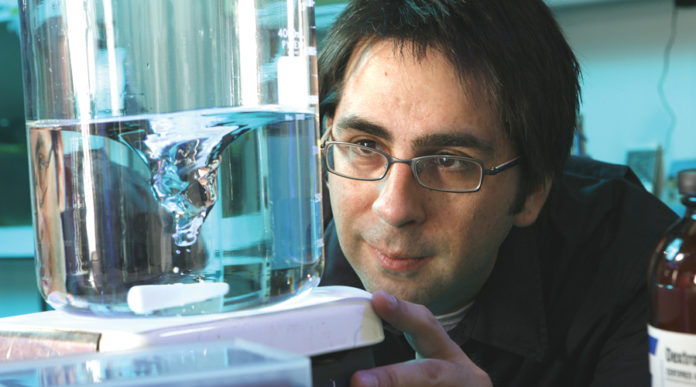The healthy heart thrives on flexibility, using any available nutrient source for fuel. But in diabetes, that flexibility stops.
Scientists at the Oklahoma Medical Research Foundation are investigating why this inflexibility occurs with diabetes and, ultimately, what can be done about it.
“The healthy heart has a dynamic capacity to respond and adapt to changes in nutrient availability—it’s an omnivore,” said OMRF researcher Kenneth Humphries, Ph.D. “The problem with diabetes, though, is the heart’s inability to use or make insulin, a hormone that allows your blood to use sugar.”
In diabetes, either you’re not making enough insulin or it’s not working properly, said Humphries. This increases the heart’s reliance on fats to meet energy demands, which can lead to damaging effects and even death.
Heart disease is the number one cause of death in diabetic patients, and it can result in a specific type of heart disease called diabetic cardiomyopathy.
“So far, there are no effective treatments for this type of heart disease,” said OMRF graduate student Maria Newhardt, who contributed to the research. “We are trying to increase our fundamental understanding of heart metabolism and how it is disrupted in diabetes so better therapeutic treatments can be developed.”
Humphries and his team conducted a study to see if they could increase flexibility in the hearts of diabetic mice by introducing the complications of obesity.
Obviously, regulating blood sugar would be the ultimate goal, but we’re looking fundamentally at how the heart responds to differences in nutrient availability,” said Humphries. “We decided to try to force the diabetic heart to use more sugar and see if that made the diabetic heart go back to its normal function.”
The team uncovered a previously unknown form of metabolic regulation. They discovered that two cellular switches in the heart that determine what nutrients the heart will use are interrelated, rather than independent, as previously thought.
These switches need to be able to turn on and off, but in diabetes, one is constantly turned on.
Newhardt said this basic finding is a next step in understanding how diabetes impacts heart health and how interventions—future drugs and therapies— might be used to treat the effects of diabetes on the heart.
Other OMRF researchers who contributed to the findings were Albert Batushansky, Ph.D., Satoshi Matsuzaki, Ph.D., and Mike Kinter, Ph.D.
The research was supported by grants from the National Institute of General Medical Sciences, National Heart, Lung, and Blood Institute, and the National Institute of Aging, all parts of the National Institutes of Health, as well as a Graduate Research Fellowship Program grant from the National Science Foundation.
A Great Place to Work ~ Join Our TEAM Today
$5,000 SIGN ON BONUS FOR FULL-TIME POSITION
We are hiring RNs for
Medical-Surgical – RNs
Emergency – RNs
Applicants should apply at
www.alliancehealthseminole.com














